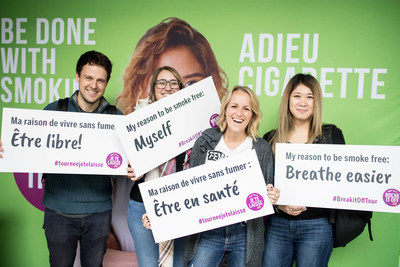York University event marks National Non-Smoking Week
TORONTO, Jan. 23, 2019 /CNW/ - Canada has made great progress in reducing cigarette smoking rates and changing attitudes about tobacco. However, more needs to be done to help the millions of Canadians who are still smoking tobacco live healthier lives.



Today, during National Non-Smoking Week, the Break It Off tour, a national awareness campaign that encourages young adults to end their relationship with cigarettes, stopped at York University to encourage young adults to quit smoking cigarettes. Under Canada's Tobacco Strategy, the Government of Canada has an ambitious plan to drive down the national cigarette-smoking rate to 5% by 2035, and events like this one will help achieve this goal and protect the health of Canadians, especially youth.
National Non-Smoking Week is an opportunity to remind Canadians of the dangers associated with tobacco use—the leading preventable cause of disease and premature death in Canada. Quitting smoking cigarettes can be one of the best things you can do to improve your health. The Government of Canada is committed to supporting Canadians on the road to quitting.
Break It Off is a collaboration between Health Canada and the Canadian Cancer Society. The tour continues until March 2019, with a number of stops planned at special events to provide young adults with information about the benefits of quitting tobacco and resources to help them stop smoking.
Health Canada encourages Canadians to visit the Break It Off website to access resources to help them quit smoking cigarettes, connect with peers, and find an event in their community. Additionally, trained specialists are available through the pan-Canadian quit line to help people develop a plan to quit smoking, answer questions and provide referrals to programs and services in their community. They can be reached online at www.gosmokefree.gc.ca/quit or toll-free at 1-866-366-3667.
Quotes
"Research shows that people are much more likely to stop smoking cigarettes and to stay smoke-free if they belong to a group of like-minded individuals who are quitting or have already quit. I am proud to champion this cause by connecting with young Canadians face to face as we mark National Non‑Smoking Week, and to encourage all Canadians to break off their bad relationships with smoking tobacco."
The Honourable Ginette Petitpas Taylor
Minister of Health
"With the remarkable progress we've made in recent years, we now know that about half of all cancers can be prevented. To make further impact, we need to take action and encourage healthy living when people are young, with the right information, at the right time, in the right way. The evidence is clear—reducing the number of people who smoke in our country is a tangible way to save lives. This is why the Canadian Cancer Society is pleased to partner with Health Canada to provide young adults with new digital resources that can support them to quit smoking and stay smoke-free."
Lynne Hudson
President and CEO of the Canadian Cancer Society
Quick Facts
- The vast majority of cigarette smokers begin smoking by adolescence or young adulthood. In Canada, 86% of current adult daily smokers had smoked their first cigarette by the age of 18.
- Quitting smoking cigarettes before the age of 40 reduces the risk of a tobacco-related death by as much as 90%.
- Break It Off events will be held at college and university campuses, trade schools, and other locations across the country. These events feature games, trivia and meaningful face-to-face conversations with young adults about the benefits of quitting smoking cigarettes and staying smoke-free.
Associated Links
Break It Off website
Break It Off on Facebook
Break It Off on Instagram
Break It Off mobile application on Google Play
Break It Off mobile application on the App Store
Canada's Tobacco Strategy
Share how tobacco products have affected your health
SOURCE Health Canada

Contacts, Thierry Bélair, Office of Ginette Petitpas Taylor, Minister of Health, 613-957-0200; Media Relations, Health Canada, 613-957-2983, [email protected]; Public Inquiries: 613-957-2991, 1-866 225-0709

Share this article